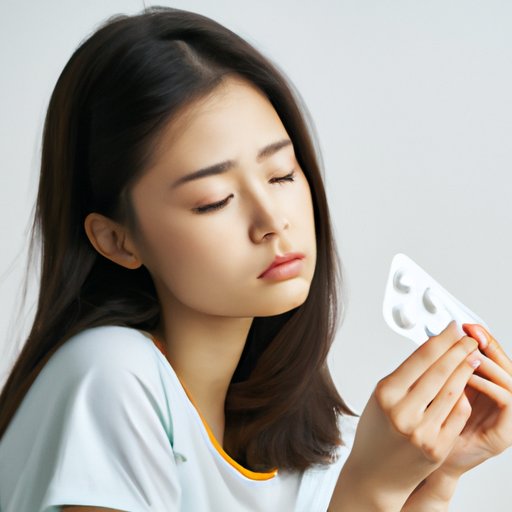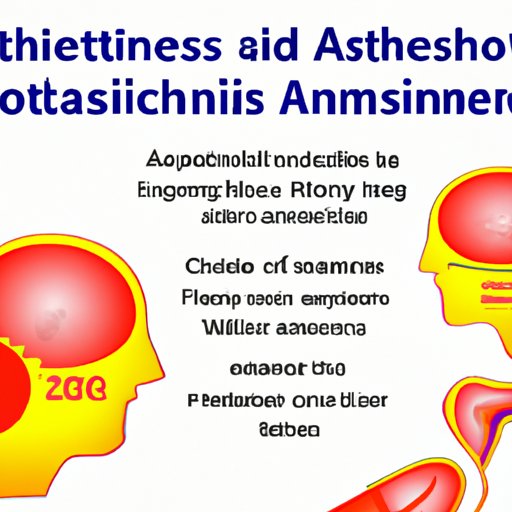
I. Introduction
If you suffer from allergies, you may be familiar with antihistamines. These drugs work by blocking the body’s histamine release, which is responsible for triggering allergy symptoms such as sneezing, itching, and runny nose. While antihistamines are generally safe and effective, they can also cause drowsiness, which can interfere with your daily activities. The purpose of this article is to explore how antihistamines make you drowsy and provide tips and strategies for managing allergies without feeling tired.

II. The Science Behind How Antihistamines Cause Drowsiness: Understanding the Chemical Composition of Antihistamines and Their Effects on the Brain
Antihistamines are drugs that block the action of histamine, a chemical released by the immune system in response to allergens. Histamine triggers a series of reactions in the body, including inflammation and dilation of blood vessels. By blocking histamine, antihistamines can relieve allergy symptoms. However, these drugs also affect the brain and the nervous system, causing drowsiness, fatigue, and reduced alertness.
When we are awake, the brain generates a specific pattern of electrical activity that maintains our alertness and cognitive functions. This pattern is disrupted by antihistamines, which interfere with the action of neurotransmitters that regulate sleep-wake cycles. In particular, antihistamines block the action of acetylcholine, a neurotransmitter that promotes wakefulness and attention. They also increase the activity of another neurotransmitter called GABA, which has a sedative effect on the brain.
The level of drowsiness varies depending on the type of antihistamine, the dose, and the individual’s sensitivity. Some antihistamines, such as diphenhydramine (Benadryl), are more likely to cause drowsiness than others, such as loratadine (Claritin).
III. Antihistamines and Drowsiness: How to Make the Most of Your Allergy Medicine without Feeling Tired
If you need to take antihistamines for your allergies, there are several strategies you can use to manage drowsiness:
Choose the right antihistamine: Talk to your healthcare provider or pharmacist about the different types of antihistamines available and their potential side effects. In general, newer antihistamines such as loratadine, cetirizine (Zyrtec), and fexofenadine (Allegra) are less likely to cause drowsiness than older ones such as diphenhydramine and chlorpheniramine. However, everyone reacts differently to medications, so what works for one person may not work for another.
Adjust the dosage: If you find that your antihistamine is making you too drowsy, ask your healthcare provider or pharmacist if you can reduce the dose. Sometimes, a lower dose can be just as effective in controlling allergy symptoms without causing as much drowsiness.
Take the medication at night: If possible, try taking your antihistamine before bedtime. This can help you avoid the drowsiness during the day and take advantage of the sedative effect at night to promote sleep. However, be aware that some antihistamines may cause vivid dreams or nightmares, which can interfere with sleep quality.
IV. From Claritin to Zyrtec: A Comprehensive Guide to Antihistamines and Their Side Effects
If you are not sure which antihistamine is right for you, here is a quick overview of the most common options:
- Loratadine (Claritin): less drowsy than other antihistamines; may cause dry mouth, headache, or gastrointestinal symptoms.
- Cetirizine (Zyrtec): less drowsy than diphenhydramine but still can cause some sedation and cognitive impairment; may cause stomach upset, fatigue, or headache.
- Fexofenadine (Allegra): generally non-drowsy; may cause headache, back pain, or cough.
- Diphenhydramine (Benadryl): highly sedating; may cause dizziness, dry mouth, or constipation.
- Chlorpheniramine (Chlor-Trimeton): highly sedating; may cause dry mouth, blurred vision, or urinary retention.
Remember that each person’s response may vary, and it is always important to follow the instructions of your healthcare provider or pharmacist.
V. Antihistamines and Sleep: How to Safely Manage Allergies and Unwanted Drowsiness
Drowsiness caused by antihistamines can also affect your sleep quality and daytime performance. Here are some tips to improve your sleep while taking antihistamines:
Stick to a regular sleep schedule: Go to bed and wake up at the same time every day, even on weekends. This can help regulate your body’s internal clock and promote better sleep. Avoid caffeinated drinks, alcohol, and heavy meals before bedtime.
Create a sleep-conducive environment: Make sure your bedroom is dark, quiet, and cool. Use earplugs, eye masks, or white noise machines if necessary. Invest in a comfortable mattress and pillow that support your sleeping posture.
Monitor drowsiness: Keep track of your level of alertness during the day and discuss any concerns with your healthcare provider. If your drowsiness persists or interferes with your daily activities, you may need to adjust your medication or try a different approach to managing your allergies.
VI. When to Take Antihistamines: Understanding the Best Time to Take Your Allergy Medicine to Avoid Daytime Sleepiness
The timing of your antihistamine dose can also affect your level of drowsiness. Here are some recommendations:
Take the medication at least one hour before exposure to allergens: This can help prevent the release of histamine and reduce the severity of allergy symptoms.
Avoid taking antihistamines with other sedatives: This can increase the risk of drowsiness and cognitive impairment.
Consider taking your medication at night: If you find that your antihistamine makes you too drowsy during the day, try taking it before bedtime. Talk to your healthcare provider to see if this is a safe option for you.
VII. Natural Alternatives to Antihistamines: Strategies to Manage Allergies Without the Risk of Drowsiness
If you prefer to manage your allergies with non-medication approaches, here are some options:
- Allergen avoidance: Identify and reduce your exposure to allergens such as dust mites, pollen, or pet dander. Use air purifiers, vacuum cleaners with HEPA filters, and hypoallergenic bedding.
- Nasal irrigation: Rinse your nasal passages with saline solution to flush out mucus and allergens. You can use a neti pot, a squeeze bottle, or a nasal spray.
- Herbal remedies: Some herbs, such as butterbur, quercetin, and stinging nettle, have been shown to have antihistamine and anti-inflammatory properties. However, these remedies may interact with other medications or cause side effects, so it is important to talk to your healthcare provider first.
VIII. Conclusion
In summary, antihistamines can cause drowsiness and interfere with your daily life. However, there are many strategies you can use to manage this side effect and make the most of your allergy medicine. Whether you choose to take antihistamines or try natural remedies, it is important to discuss your options with your healthcare provider and monitor your symptoms regularly. By following these tips and being proactive about your allergy management, you can enjoy a more comfortable and energized life.
Call to action: If you are experiencing unwanted drowsiness from antihistamines, talk to your healthcare provider or pharmacist about possible solutions. Whether you need to adjust the dose, switch to a different medication, or try non-medication approaches, there are many options available to help you manage your allergies without feeling tired.




